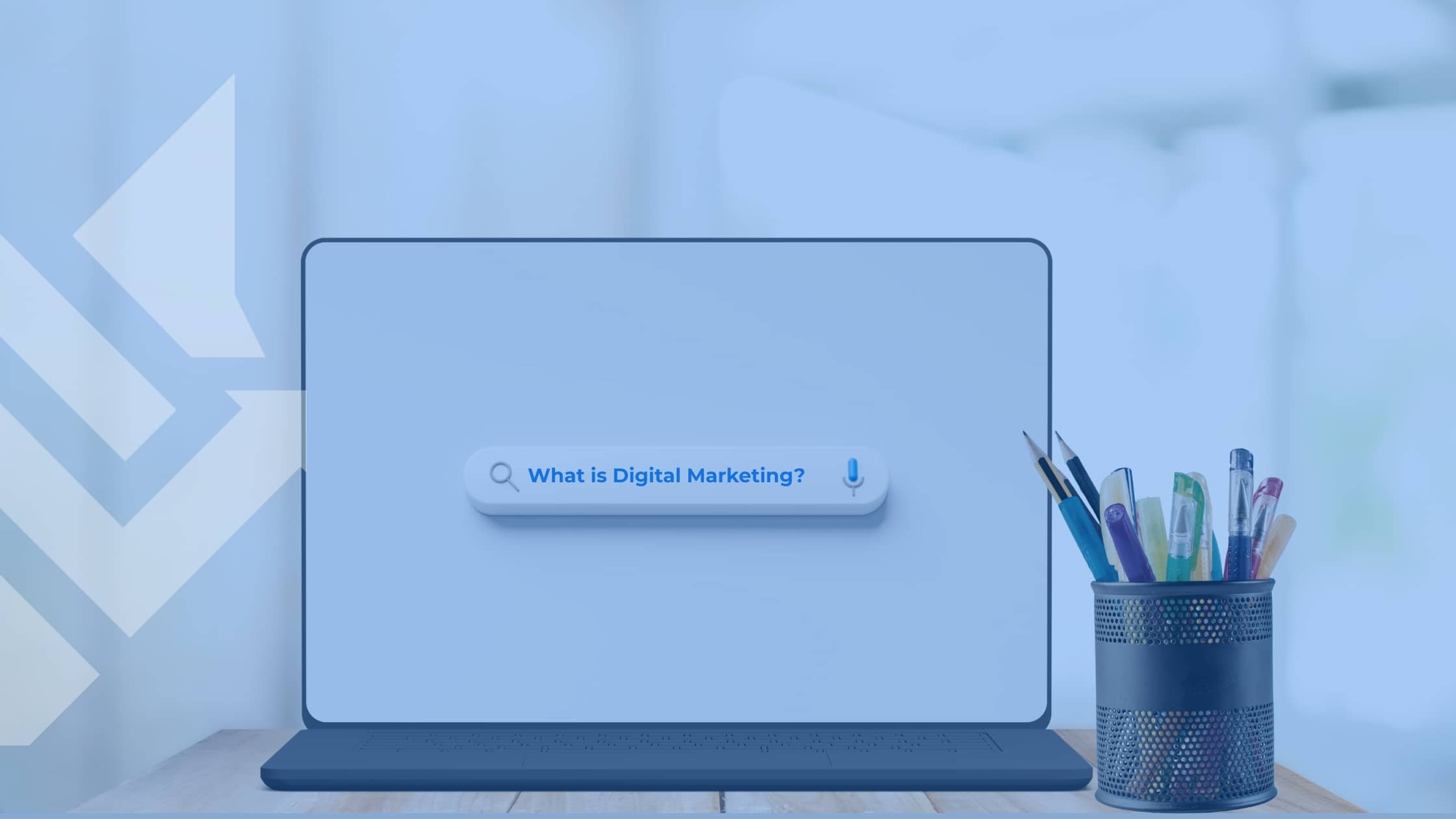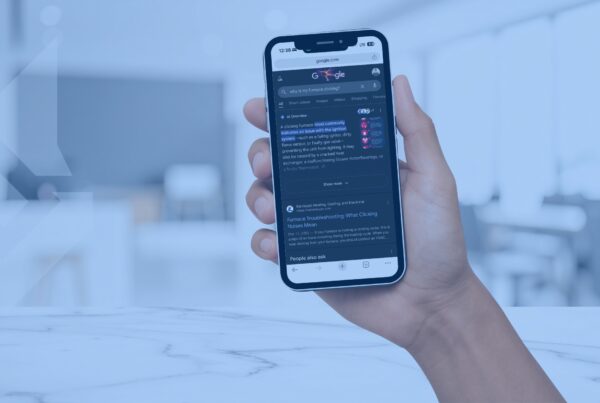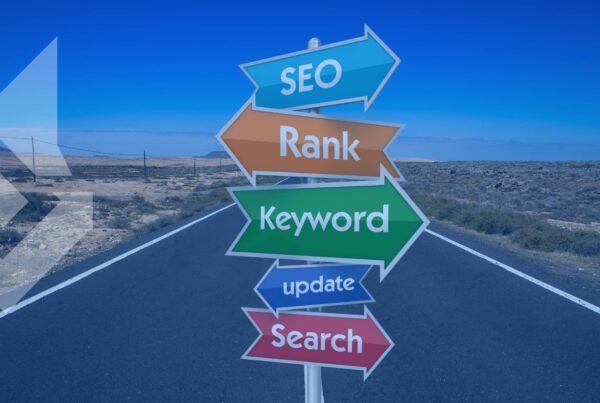Last updated on February 6th, 2026 at 08:24 am
Digital marketing doesn’t have to be a labyrinth forever. If you’re a small business owner or leader, chances are you’ve Googled things like, “Why isn’t my business showing up on Google?” or “Do I really need an Instagram for business?” Here’s a roundup of digital marketing FAQs our team answers on a regular basis.
Below are the same core questions from the original FAQ, updated for 2026 with clearer explanations and more current best practices.
Contents
1. What is digital marketing?
Digital marketing is the set of tools and actions that help people find your business online, trust you, and contact you. For home-service businesses, it is rarely just one thing. It is usually a mix of your website, your Google Business Profile (Maps), reviews, service-area pages, photos of completed work, paid ads, email follow-ups, and the behind-the-scenes tracking that tells you what is actually working.
It’s how people find your business online. It includes everything from your website and Google listing to online reviews, ads, emails, and even blog content.
When someone searches for a service you offer and finds your business, that is digital marketing in action. The goal is to help more people discover you, trust you, and contact you.
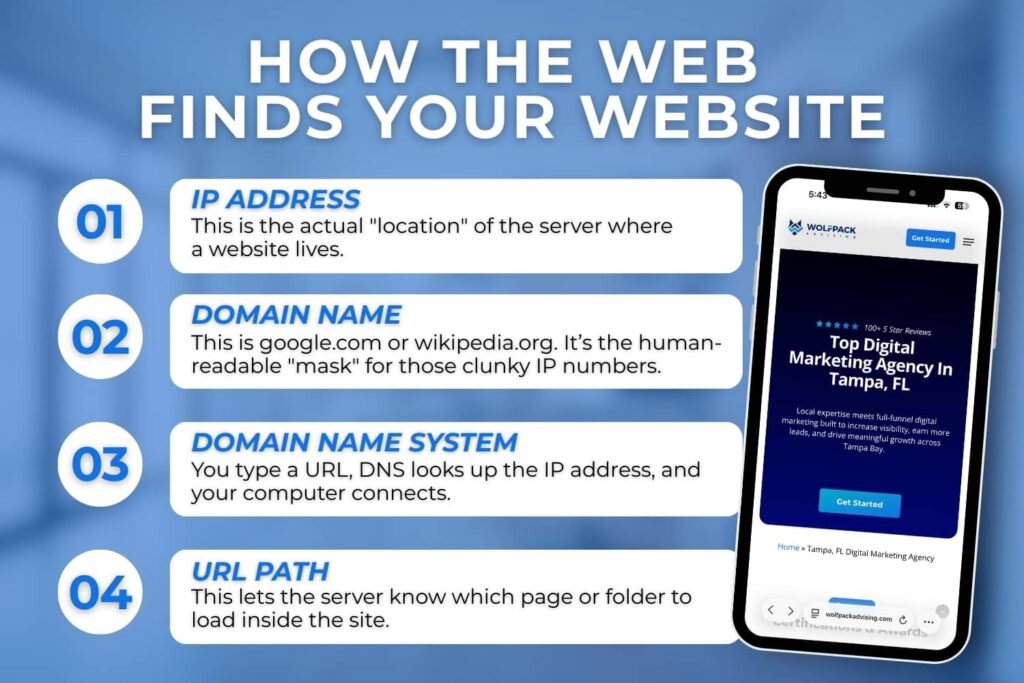
2. What’s the difference between a domain and hosting?
Your domain is the name people type to find you online. Your hosting is where the website lives, meaning the place that stores your pages, photos, and files so they can load when someone visits your domain.
Hosting is how all the pieces of your website, like your images, text, and pages, are stored. It’s what makes your website actually show up when someone visits your domain.
You need both to have a working website.
Think of it like this: If your domain is your digital street address, hosting is the building where everything lives. Without hosting, your domain has nowhere to go.
If you are not sure whether your hosting is helping or hurting you, that is not unusual. Many business owners inherit hosting decisions from a past vendor. Choosing a good hosting provider also helps your website load faster and stay online, which is important.
3. Why does my website show up two different ways?
You might notice your website loads as both www.yourbusiness.com and yourbusiness.com, or sometimes as http instead of https. Even though they look similar, search engines can see these as different websites.
The fix is usually straightforward, but it needs to be done correctly. Your site should pick one primary version, and most businesses use https://yourbusiness.com. Then everything should consistently route to that version.
That typically involves 301 redirects, which are permanent forwarding rules, plus canonical tags, which are a simple signal that tells Google which page is the main version. Google’s guidance on this is covered in its documentation on consolidating duplicate URLs.
If both versions are active, Google might think you have duplicate content, which can hurt your rankings. It can also make your site look less trustworthy to visitors.
Once that is cleaned up, your reporting becomes more accurate, your SEO signals consolidate, and your site looks more consistent to customers, especially when they click links from different places.
4. Why can’t I find my business on Google Maps?
This is one of the most common and most frustrating issues for home-service businesses. Maps’ visibility can feel random when you do not know what drives it. The good news is that there are clear reasons this happens, and most are fixable.
Fundamental Profile Optimization
First, the basics still matter. A Google Business Profile that is not verified, uses the wrong category, has incomplete services, or has inconsistent contact info can struggle to show up.
Even small details like mismatched business hours, missing photos, or a vague description can reduce confidence.
Local Search Ranking Factors
Second, some factors affect whether you appear for a specific search.
Google Maps results are influenced by relevance, proximity, and prominence. In other words, you need to match what someone searched, be reasonably close (or set up correctly as a service-area business), and show signals that you are an established, trusted option.
Reviews, photos, and consistent activity can support that prominence piece over time.
Compliance and Account Health
Third, profiles can be restricted or suspended if Google believes guidelines were violated, sometimes unintentionally. Businesses run into issues with address rules, category choices, or listings that look like they represent multiple brands at the same location.
Google outlines expectations in its Google Business Profile guidelines, and it is worth reviewing if you have seen sudden visibility drops.
Strategic Action Plan for Growth
For many businesses, the practical path looks like this. Confirm verification, confirm your primary category fits your main revenue service, fill out every relevant field, add real photos of your team and work, and build a steady review habit instead of a one-time push.
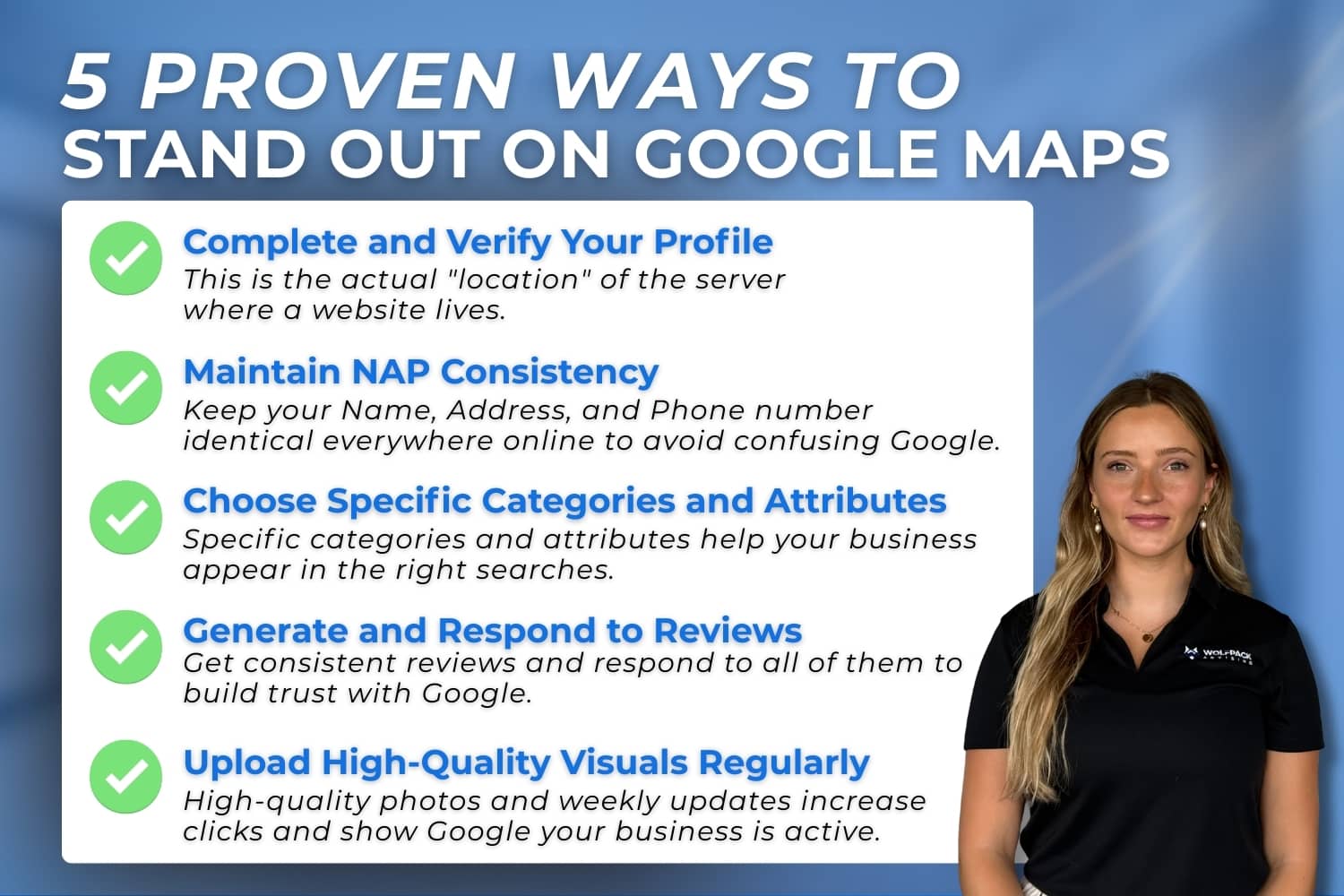
5. Can I get more leads without redoing my whole website?
Yes, and most of the time you should try a few high-impact improvements before paying for a full redesign. A redesign can be helpful, but it is not automatically the fastest route to more leads.
- Claim and complete your Google Business Profile
- Ask for reviews from recent customers
- Write blog posts that answer common questions
- Add your business to trusted directories like Yelp or Angi
- Share simple updates or job photos on social media
It is also worth checking page titles and descriptions, meaning the text that shows in Google results. These do not have to be fancy, but they should match the service and location.
A step-by-step digital marketing checklist can help prioritize these improvements so you are not guessing what to do first.
Small actions like these can boost visibility and trust without touching your website’s design.
6. How many reviews should I have?
There is no magic number that guarantees leads. What matters more than a perfect total is consistency. A business with a steady flow of recent reviews often looks more active and trustworthy than a business that collected a bunch two years ago and then stopped.
A good starting target for many home-service businesses is two to four new reviews per month, adjusting upward if your job volume is high. The exact pace matters less than the habit.
BrightLocal’s consumer research has consistently shown reviews play a major role in local decision-making and trust for service providers, which is why review generation is a practical growth lever rather than just a reputation concern.
According to BrightLocal, 87 percent of people read reviews for local businesses.
BrightLocal summarizes this in its Local Consumer Review Survey.
The easiest time to ask is right after the job is completed, especially if the customer just thanked you, texted you back quickly, or mentioned they would recommend you. Send a short message with a direct link, and keep it simple.
Many businesses also benefit from light automation, as long as it feels human and the timing makes sense.
At WolfPack, we offer Review Request Automation to help you capture these testimonials consistently without the manual back-and-forth, ensuring every satisfied client has the opportunity to support your business’s online prominence.
7. What are keywords, and how many should I track?
Keywords are the words and phrases people search for on Google. Some examples include:
- “roof repair near me”
- “best plumber in Lakeland”
- “How to get rid of ants in the kitchen.”
Most small businesses can start by tracking 20 to 50 relevant keywords. You do not need hundreds. You want a list that reflects your core services and core service areas. If you try to track everything, you will spend time watching noise instead of making decisions.
If you work with an agency or use an SEO tool, the goal is the same. Pick a focused keyword set that reflects what you sell and where you sell it, then build or improve pages that deserve to rank for those terms.
The goal is not to rank for everything, but to rank for the searches that matter most.
8. What types of keywords should I use?
A strong keyword strategy usually includes a mix, because customers search differently depending on where they are in the buying process.
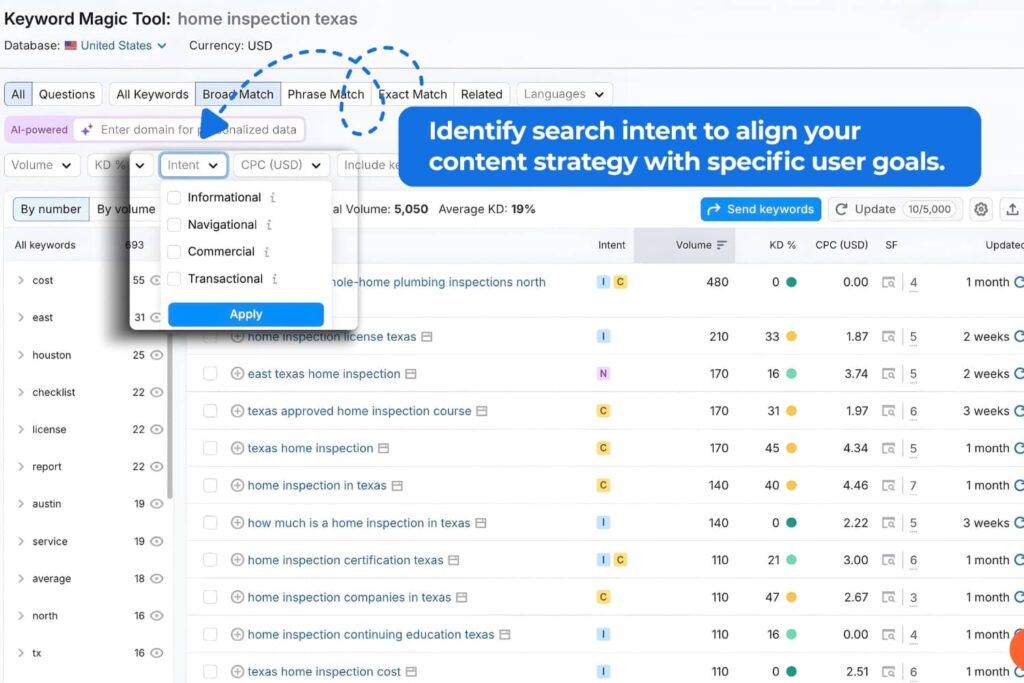
It helps to use a mix of keyword types:
- Local keywords include your city or service area, for example, “electrician in Tampa.” These often bring high-intent leads because the person already knows what they need and just wants a provider.
- Informational keywords are question-based, like “how often should I service my HVAC” or “why does my drain smell.” These do not always produce same-day leads, but they build trust and bring in homeowners earlier, often before they have chosen a company.
- Branded keywords include your business name. They matter because people will search for you after seeing a truck, a yard sign, a referral text, or an ad. Making sure your branded results look clean, with accurate info, strong reviews, and correct links, protects the leads you already earned.
- Transactional keywords show a readiness to act, such as “book termite inspection” or “same-day garage door repair.” These can convert well when the landing page matches the offer and makes the next step easy.
Using a mix helps your business show up at different stages of the customer journey.
9. Should my landing page look like my website?
Not completely. A landing page should not feel like a totally different company, but it also should not behave like your full website.
Your website is like a full brochure. It tells people who you are, what you do, and gives them lots of ways to learn more.
A landing page is more like a flyer for one specific thing. It has one clear goal, like getting someone to book a service, call you, or fill out a form.
It should still look like your brand (same logo, colors, and tone), but it should be simpler and more focused. Keep only what supports the goal. Remove anything that might distract the visitor.
If someone lands on the page, they should know exactly what to do next.
When landing pages underperform, it is often because they feel like a mini-homepage instead of a focused one-goal page.
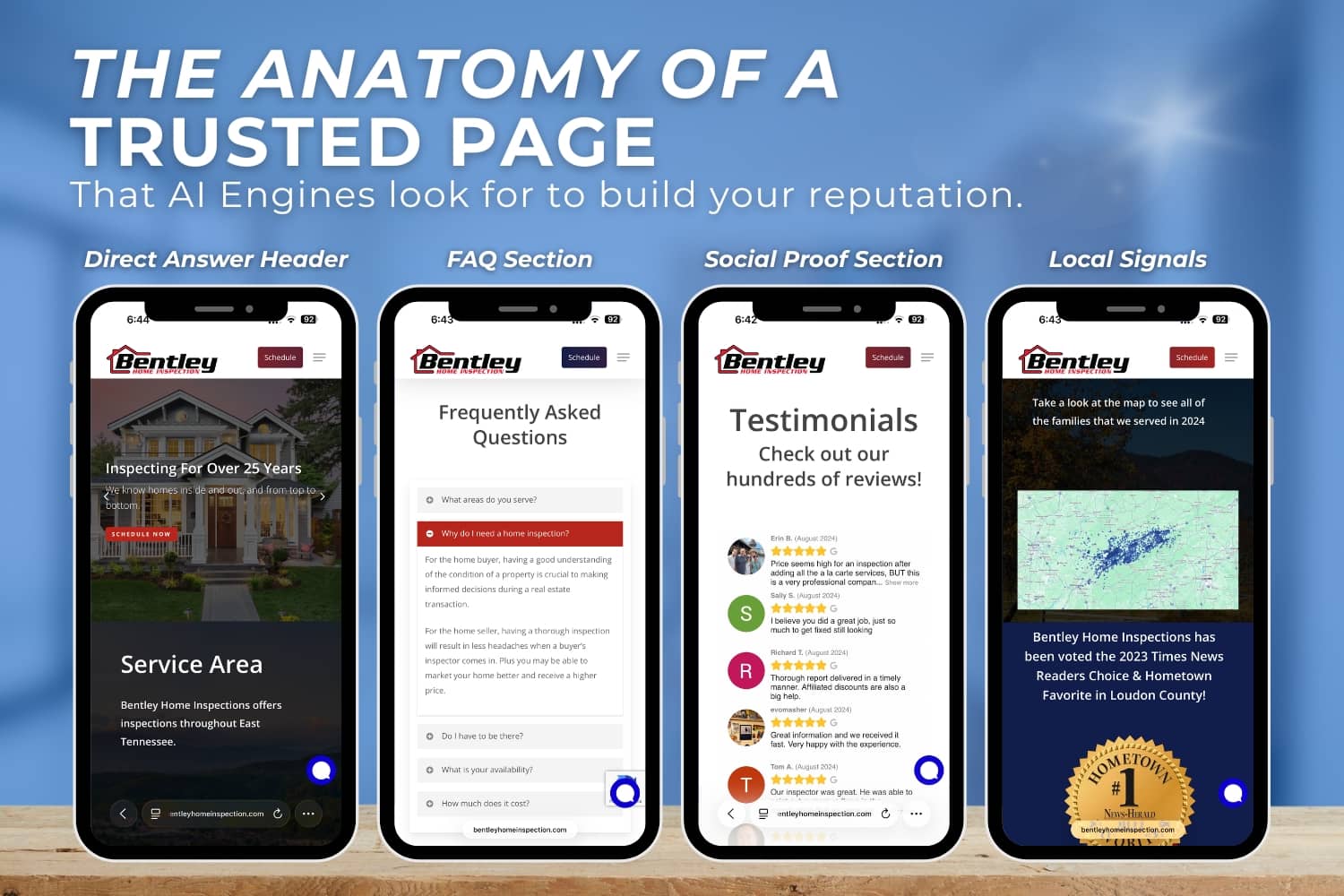
10. Should I still write blog posts, even if they aren’t local?
Yes. Blogging helps you stay visible online, even if the content is not tied to a specific city. Even if the post is not explicitly about your offered service.
Google values helpful content.
Google’s long-term direction has been consistent here. Content is rewarded when it is genuinely helpful and written by someone who understands the subject. You do not need to chase trends. You need to answer the questions homeowners are already typing into search.
If you find the keyphrase “home water quality” and write a blog post that answers “how to test water quality in your home”, that could attract traffic from anywhere, but it still builds your authority. And it may help someone local decide to hire you.
On the other hand, if you do no keyword research and just decide to write a blog post about why your services are important, you probably won’t see much (if any) traffic.
We recommend posting blogs (based on FAQs you notice and optimized for valuable keywords) consistently. It’s a critical part of a long-term SEO strategy. Even two posts a month will make a difference!
11. What else can I do to improve my online marketing?
After the big pieces are in place, the biggest wins often come from boring, repeatable habits.
Here are a few simple tasks that many businesses overlook:
- Set up Google Search Console to track site health and rankings
- Reply to all reviews, even the tough ones
- Use tracking tools to see where leads are coming from
- Keep your name, address, and phone number the same everywhere online
These actions take very little time but can have a big impact on how your business performs in search results.
Integrate in-person marketing with your digital marketing
In-person marketing (events, sponsorships, referral partners) works even better when you connect it to your online presence.
Before the event
Post that you’ll be attending or sponsoring on your Google Business Profile and social media. Tag partners/organizers and include a simple next step (stop by, say hi, enter a giveaway, book an estimate).
After the event
Share a quick recap with photos. Upload a few strong images to your Google Business Profile and post a thank-you while tagging anyone you partnered with. This builds trust fast because it shows real people and real community involvement.
Follow up in your CRM
Add new contacts within 24–48 hours and create simple tasks (send a thank-you, connect on social, add to a light email nurture list, and set a reminder to follow up in a few weeks).
Finally, many home-service businesses leave money on the table by ignoring email. A simple monthly newsletter or follow-up sequence keeps you top-of-mind for repeat service and referrals, especially when it is built around real seasonal needs and homeowner concerns.
Campaign ideas and timing examples are covered in the newsletter tips for more clients and steady referrals.
FAQ (Quick Reference)
| Question | Short answer |
|---|---|
| Why is my website showing both http and https versions? | Google may see multiple versions of the same site unless redirects and canonical tags point everything to one primary URL. A web partner can usually fix this with 301 redirects and a consistent HTTPS setup. |
| Why does my Google Business Profile not show up for my service area? | Visibility depends on profile completeness, correct categories, proximity, and trust signals like reviews and recent activity. Guideline issues can also limit reach, so it helps to follow the Google Business Profile guidelines. |
| How many keywords should a home-service company focus on first? | Start with a small set, usually 20 to 50, tied to your core services and top service areas. Expanding is easier after you know which terms actually drive calls and forms. |
| Do blog posts help if people outside my city read them? | Yes, helpful posts can build authority and bring in local readers who search the same questions. Topic planning works best when it is driven by real customer questions and search demand. |
| What is the fastest way to know if online marketing is working? | Track the actions that matter, such as phone calls and form submissions, and review search visibility in Google Search Console. Clear tracking turns marketing into decisions instead of guesses. |
Conclusion
Digital marketing can feel complicated because it touches so many moving parts. Your website, your map listing, reviews, content, ads, and tracking all affect results. Most of the time, improvement comes from getting the fundamentals right and staying consistent long enough for the results to compound.
But if you’re still not sure where to start, or you’re ready to do more with your marketing, we can help. Schedule a free consultation with our team, and we’ll build a strategy that works for you.

